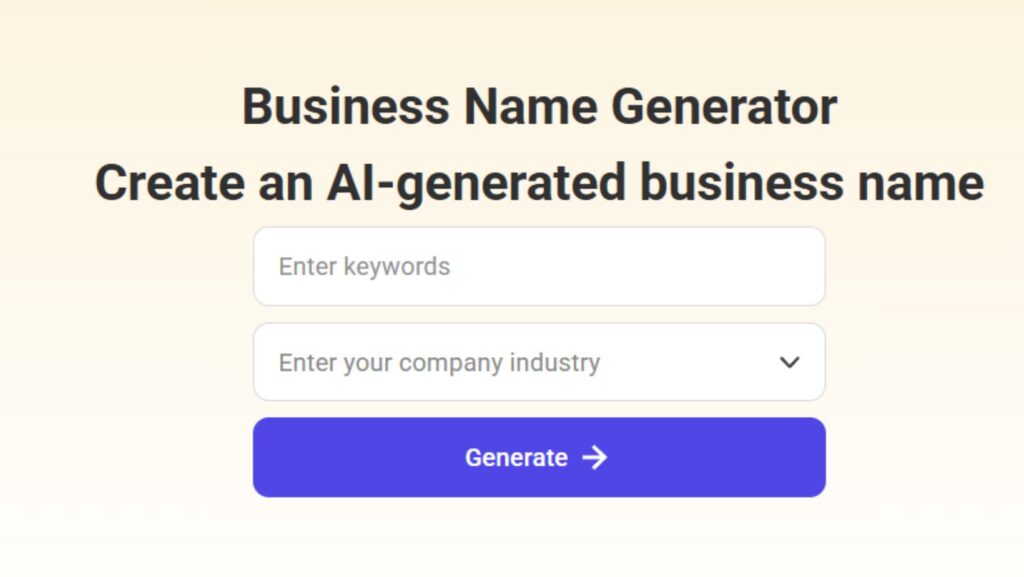
Using a name generator can be a fast and accessible way to find a business name. But if you rely on automation alone, you may end up with a generic, mismatched, or even legally risky result. Many entrepreneurs make common mistakes that reduce the effectiveness of these tools—from rushing the decision to skipping key validation steps. In this article, we’ll explore the typical errors users make when naming a business with a generator—and how to avoid them.
Why Generators Won’t do All the Work for You
Business name generators are powerful tools, but they don’t know your brand or market as well as you do. They rely on algorithms, word associations, and patterns, but the quality of the result depends on the input. If you feed them vague or unrelated keywords, you’ll get vague or unrelated names.
Generators often repeat templates or popular name structures, which can lead to a lack of originality. A generator might suggest usable ideas, but it’s up to you to refine, test, and choose a name that fits your long-term brand strategy.
Mistake: Choosing the First Name you like Without Checking It
It’s tempting to choose a name that sounds good at first glance. But just because it’s catchy doesn’t mean it’s available, scalable, or legally safe. You need to go beyond gut instinct and check multiple areas before moving forward.
What to check before selecting a generated business name
- Domain name availability in your preferred extension
- Social media handle availability across major platforms
- Trademark conflicts or existing registrations
- Search engine presence and keyword competition
- Visual compatibility for branding and logo use
Skipping these checks can cost you time, money, and reputation. Even if the name passes some tests, review how it fits your brand story and target audience before making a final decision.
Mistake: Entering Overly Broad or Mismatched Keywords
Generators need direction to produce quality results. If you enter generic terms like “tech” or “global” without context, the output will likely be bland or repetitive. Think about what your business truly represents—its values, audience, and offering.
Your input should include emotional tone, relevant themes, and clear industry hints. The more specific the prompt, the better the results. Avoid mixing unrelated ideas or choosing buzzwords just because they sound trendy.
Mistake: Ignoring Audience Fit and Cultural Context
A name that looks great in one language might be confusing or inappropriate in another. If your brand operates in multiple regions or plans to expand globally, you need to test the name for clarity, pronunciation, and potential misunderstandings.

What works for a startup targeting Gen Z may not land the same way for a B2B brand. Consider tone, formality, and associations in your specific niche. Misalignment with your audience leads to weak brand recall and poor engagement.
Mistake: Focusing Only on Creativity Without Strategy
Originality is important, but not at the expense of clarity, scalability, or searchability. Many generated names are playful or abstract, but don’t serve your marketing or SEO goals.
Think about whether the name will still make sense as your business grows. Can it stretch into other products or markets? Is it readable, typable, and easy to say out loud? If not, it might create more problems than it solves.
Mistake: Skipping Testing and Feedback Before Finalizing
Relying on your own opinion can be risky. What seems memorable or clever to you might be confusing to others. Even the best name should be validated with real people. Share a shortlist with potential customers, peers, or friends. Ask how they interpret it and whether it stands out.

Consider factors like ease of recall, pronunciation, and emotional impact. Step away from the name for a day and revisit it with a fresh perspective. You may notice issues that weren’t clear before.
Questions and Answers
Can I use a name that already exists in another country?
It’s not recommended. Even if it’s not trademarked in your region, it can lead to confusion or legal disputes.
Do I need to register the name if it’s unique?
Yes. Trademark registration protects your brand from copycats and strengthens your legal position.
What if all good names are taken as domains?
Get creative with suffixes, local extensions, or spelling variations. But stay consistent across channels.
Can I use one name for website, social, and app?
Ideally, yes. A unified presence helps people find and remember you more easily.
How can I tell if a name won’t work long-term?
If it’s hard to pronounce, too narrow for growth, or sounds outdated, it may limit your brand in the future.











